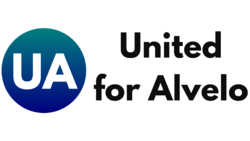United for Alvelo 1723 General Election Campaign (Nouvelle Alexandrie)
  Campaign logo(s) for the 1723 United for Alvelo general election campaign. | |
| Campaign Year | 1723 |
|---|---|
| Campaign Name |
Somos Más y No Tenemos Miedo There's More of Us, And We Aren't Afraid |
| Party Name | United for Alvelo |
| Party Leader | Party Leader |
| Campaign Slogan | Pablo Alvelo Nieves |
| Campaign Launch Date | 1723 AN |
| Headquarters | Potosí, Santander |
| Political Alignment |
|
| Seats | 97 seats (Santander) |
| Key Surrogates | |
| Amount of Events Held | Template:Notable Campaign Events |
| Regions Visited | Santander |
The United for Alvelo 1723 general election campaign, also known as the "Somos Más y No Tenemos Miedo" (There's More of Us, And We Aren't Afraid) campaign, marks a pivotal moment in the political landscape of Nouvelle Alexandrie. Officially inaugurated on XX.XX.1723 AN through the 1723 UfA Opening Day Rally and Fair, the campaign serves as the electoral arm of the United for Alvelo political group. Spearheaded by Pablo Alvelo Nieves, the campaign aims to capture seats for the party in the Santander region during the 1723 general elections.
The campaign is rooted in a blend of left-leaning economic policy, liberal social values, and a strong populist undertone, as encapsulated in its distinct platform. Its headquarters are situated in Potosí, Santander, a locale that significantly resonates with the party's grassroots ethos and the home of its leader, Pablo Alvelo Nieves. As the party fields 97 candidates for every seat Santander sends to the Cortes Federales of Nouvelle Alexandrie, it employs a robust network of key surrogates, including notable figures such as Martina Gonzaga and Phillippe Roi, who amplify its message. This article delves into the political alignment, organizational structure, and strategic initiatives that form the bedrock of the United for Alvelo 1723 general election campaign.
Political Alignment
- Economic Policy (-0.6): While the UfA leans towards left-wing policies with the Unified Social Credit Policy and emphasis on workers' rights, the party also has some centrist policies like zero-interest loans for local businesses. This lands it at -0.6 on the economic policy scale.
- Social Policy (-0.8): The UfA platform strongly emphasizes liberal values such as universal healthcare and education but also includes some moderate points like the civic service requirement, placing it at -0.8.
- Geographic Tendency (-0.7): With a focus on urban renewal and public transport, the party is skewed towards urban areas, but its broader social policies could have a more neutral or even rural appeal. A -0.7 rating reflects this.
- Cultural Tendency (-0.9): The UfA has a strong populist tilt, as seen in its grassroots beginnings and its leader Pablo Alvelo Nieves' close relationship with his community. Therefore, it rates at -0.9.
Background
The formation and rise of the United for Alvelo (UfA) political group is inextricably linked with its founding leader, Pablo Alvelo Nieves. Nieves, who has been a mainstay in Nouvelle Alexandrien politics since his election as the first independent Mayor of Potosí, Santander, in 1715 AN, utilized his grassroots popularity and administrative acumen as political capital for a transition to federal politics. In the 1718 general elections, despite missing the ballot filing deadline, a write-in campaign organized by local supporters and donors succeeded in electing him as an independent Deputy of the Federal Assembly from Santander. As a deputy, Nieves has been an unwavering advocate for workers' rights, educational investments, and improvements in public transport.
Recognizing the growing need for an organized political movement to institutionalize and further his reformist agenda, Nieves founded the United for Alvelo (UfA) party in Santander in 1722 AN. The formation of the UfA was a strategic move, aimed not only at consolidating support for Nieves' legislative projects but also at preparing a robust campaign for his re-election bid in the 1723 general elections. The UfA immediately began to organize its party infrastructure, launching grassroots campaigns, town hall meetings, and policy discussions to engage citizens.
In anticipation of the upcoming 1723 general elections, the UfA undertook initiatives to expand its reach and contest all seats available for Santander in the Federal Assembly. Sensing a shift in the political winds, several candidates who had initially planned to run as independents were swayed by the UfA's rapidly growing appeal and threw their lot in with the party. These strategic alliances boosted the UfA’s standing, offering it a more comprehensive slate of candidates and enhancing its credibility as a mainstream political movement.
The party seized this moment to articulate a unique ideological stance. The UfA developed a policy framework known as the Unified Social Credit Policy (USCP). This policy aims to establish a social credit system that provides financial supplements to households with below-average income, ensuring basic economic stability, called the Social Credit Dividend. Additionally, the USCP proposes creating a government-controlled fund that would finance community projects, thereby stimulating local economies and providing jobs. A particularly novel aspect of the USCP is the introduction of a civil service requirement for all New Alexandrians when they turn 18, for at least one (1) year. This mandates that all citizens, upon reaching 18 years of age, are to serve a period in either military, medical, or other forms of government or community service, in return for certain educational, economic, and/or housing benefits.
Platform
The political platform of United for Alvelo (UfA) is a comprehensive manifesto that outlines the party's policy initiatives and ideological beliefs. Below is a detailed overview of the key pillars of UfA's platform, aimed at building a progressive, transparent, and socially equitable society in Nouvelle Alexandrie.
National Defense
- Cost-Effective Defense Policy: UfA proposes to undertake a comprehensive review of defense expenditures to ensure that funds are not being wasted on redundant or ineffective systems.
- Public-Private Partnerships: To avoid enriching defense contractors at the expense of taxpayers, UfA suggests implementing a cooperative model wherein the government works closely with private sector firms under stringent contractual conditions that prioritize public interest over profits.
- Technology Investment: Advocating for more spending on R&D to develop cost-effective, high-performance technologies that can improve national defense without escalating costs.
Public Accountability and Transparency
- Open Book Government for National, Regional, and Local Governments: Establishment of an online portal where all government spending by all levels of government is documented and made accessible to the public, with proper documentation, verified data, and citations.
- Spending Review Commission: Creation of an independent body that performs regular audits on government expenditures, publishing their findings bi-annually.
- Whistleblower Protection: Legislation to protect individuals who expose financial mismanagement or corruption within the government, thereby encouraging more transparency.
Foreign Policy: Pro-Raspur Pact
- Strengthening Alliances: Active participation in Raspur Pact initiatives aimed at promoting regional stability and cooperation.
- Trade Partnerships: Leveraging the alliance to negotiate beneficial trade agreements, fostering economic growth in Nouvelle Alexandrie.
- Collective Security: Advocacy for more collaborative defense mechanisms within the Raspur Pact to ensure collective security with minimized individual national expense.
Universal Healthcare
- Universal Access: Legislation to provide every citizen with access to a basic level of medical care, regardless of their financial condition.
- Preventive Medicine: Investment in educational programs and community health to reduce the future burden on healthcare systems.
- Cost Control: Implementation of cost control mechanisms to prevent the exploitation of patients through overbilling and unnecessary treatments.
Unified Social Credit Policy
- Social Credit Dividend: A monthly financial supplement provided to households with below-average income to ensure basic economic stability.
- Community Project Fund: Establishment of a government-controlled fund to finance community projects, stimulating local economies and generating employment.
- Social Credit Bonds: In essence, a "baby bonds" program, which would establish a government-backed savings account for every newborn citizen, starting in 1726 AN. The initial deposit and subsequent government contributions would be scaled based on family income, with the intent of reducing wealth inequality. These accounts could be accessed at adulthood for approved expenditures such as education, home purchase, or entrepreneurship.
- Civil Service Requirement: Introduction of a compulsory (1) one-year civil service requirement for all New Alexandrien citizens upon turning 18, starting in 1726 AN. This service can be in the military, medical, or other forms of government or community service. In return, these individuals will receive benefits such as educational scholarships, low-interest loans for housing, or economic grants.
Education
- Universal Access to Quality Education: Commitment to free public education from pre-school to university level.
- Teacher Support: Investment in training and providing competitive salaries to teachers to ensure high-quality education.
- Curriculum Reform: Focus on developing a curriculum that prepares students for modern job markets and civic responsibilities.
Labor
- Workers' Rights: Legislation to protect workers from exploitation, including minimum wage laws, limits on working hours, and workplace safety standards.
- Skill Development: Investment in vocational training programs to improve skill sets and job prospects for the working class.
- Collective Bargaining: Strengthening laws that enable workers to collectively negotiate for better terms and conditions.
Government Corruption and Public Spending
- Anti-Corruption Task Force: Establishment of an independent body to investigate and prosecute cases of government corruption.
- Public Spending Oversight: Create a Spending Review Commission to include public participation in decisions about budget allocations.
- Transparency in Lobbying: Legislation to disclose all lobbying activities aimed at influencing government policy.
Economy and Jobs
- SME Support: Providing zero-interest loans and tax incentives for small and medium enterprises to encourage job creation.
- Innovation Hubs: Establishment of government-funded innovation centers that help startups and entrepreneurs.
- Foreign Investment Regulation: Creating frameworks to ensure that foreign investments generate local jobs and comply with the country's labor laws.
Environment
- Green Energy Transition: Investment in renewable energy sources to reduce dependence on fossil fuels.
- Conservation Programs: Initiatives to preserve biodiversity and natural habitats through stricter zoning laws.
- Sustainable Agriculture: Promotion of farming practices that are environmentally sustainable.
Agriculture
- Rural Development Fund: A government-backed fund to improve infrastructure and education in rural areas.
- Agri-tech Investment: Funding for technology that makes farming more efficient and less resource-intensive.
- Market Access: Programs to connect farmers directly with consumers, cutting out middlemen and improving profits.
Infrastructure
- Urban Renewal: A focus on upgrading existing urban infrastructure, prioritizing public transport and renewable energy sources.
- Rural Connectivity: Investment in connecting rural areas to urban centers through better road networks and Internet access.
- Infrastructure Maintenance: Regular review and maintenance of existing infrastructure to prevent degradation and costly future repairs.
Crime
- Community Policing: Implementation of community policing initiatives to build trust and cooperation between law enforcement agencies and the communities they serve.
- Justice System Reform: Review of the criminal justice system to focus on rehabilitation over punishment, when possible.
- Anti-Trafficking Initiatives: Special units focused on tackling human trafficking and organized crime.
Tech Advancement
- Public-Private Tech Partnerships: Encouragement of collaborations between government and tech companies for innovation in public services.
- Data Privacy Laws: Legislation to protect citizens' data and privacy in the digital age.
- Digital Education: Incorporation of digital literacy courses in educational curricula.
Foreign Affairs
- Diplomatic Expansion: Establishing new embassies and consulates to strengthen Nouvelle Alexandrie's global presence.
- Human Rights Diplomacy: Advocacy for human rights and democracy in international forums.
- Trade Relations: Negotiation of mutually beneficial trade agreements with a focus on sustainable and ethical practices.